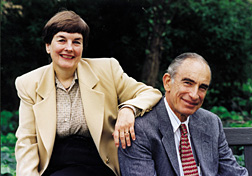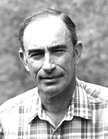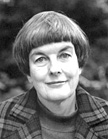Population biologists Paul Ehrlich and wife, Anne, to visit Cornell for Center for Environment series
By Roger Segelken

"Human Natures: Genes, Culture and the Human Prospect" is the topic for Stanford University biologist Paul R. Ehrlich in a public lecture Wednesday, April 25, at 4:45 p.m. in Cornell's Call Alumni Auditorium in Kennedy Hall.
Ehrlich and his wife, Anne Howland Ehrlich, are the 2001 Jill and Ken Iscol Distinguished Environmental Lecturers in the annual series presented by the Cornell Center for the Environment. Paul Ehrlich, who is the Bing Professor of Population Studies in Stanford University's Department of Biological Sciences, also will present a scholarly lecture on Tuesday, April 24, at 4:30 p.m. in Call Alumni Auditorium on the topic "Tough Problems in Human Evolution." Both lectures are free and open to the public.
Paul Ehrlich has been an outspoken pioneer in alerting the public to the problems of overpopulation and in raising issues of population, resources and the environment as matters of public policy. He helped found and is currently president of the Center for Conservation Biology at Stanford. His biological research is in the structure, dynamics and genetics of natural butterfly populations. Along with Peter Raven, Ehrlich is regarded as the co-founder of the field of coevolution. The Ehrlichs met in the 1950s at University of Kansas, where Paul Ehrlich earned his Ph.D. in 1957.
Anne Ehrlich conducts research in population biology as a senior research associate in Stanford's Department of Biological Sciences and as associate director of the Center for Conservation Biology. She has taught a popular course since 1981 in environmental policy for the Human Biology Program at Stanford and is the co-author of technical articles in that field. She also writes extensively on issues of public concern, such as population control, environmental protection and the environmental consequences of nuclear war, and is the co-author of 10 books. In addition to The Population Explosion (1990), she is co-author with her husband of Healing the Planet (1991), The Stork and the Plow (1995)Betrayal of Science and Reason (1996), among others. In his April 25 lecture, which will be introduced by Cornell President Hunter Rawlings, Paul Ehrlich is expected to give an overview of the genetic and cultural evolutionary history of humanity and to explain its pertinence to today's world. He plans to emphasize (contrary to the views of evolutionary psychologists) that most interesting human behavior is a product of cultural evolution. Also to be discussed are the ways in which humanity might consciously direct its cultural evolution towards the goals of environmental sustainability and social justice.

In the April 24 lecture, Paul Ehrlich will outline some of the unresolved issues in human evolution, including: the nature of our relationship to the other great apes, why we became upright, why the human brain expanded so rapidly, what is consciousness, how and when did language and religion evolve and what was the geographic pattern of human diversification. He will give special emphasis to the roles of genetic evolution and cultural macro- and micro-evolution in human behavior.

Among her activities at Cornell as an Iscol Lecturer, Anne Ehrlich will participate in a symposium, "Where Science Meets Public Policy: A Discussion of Public Outreach," on Wednesday, April 24, at 2:30 p.m. in 300 Rice Hall. A book signing for Paul Ehrlich's latest work, Human Natures: Genes, Cultures and the Human Prospect, is planned on Thursday, April 26, from 11:30 a.m. to 1 p.m. in the Campus Book Store, where other notable books by the Ehrlichs also will be available.
Cornell's Iscol Lecture series seeks to the enrich the intellectual character of the university and the community by bringing to campus distinguished policy makers and scientists to address environmental issues of paramount importance to humankind. In addition to the public presentations, Iscol Lecturers participate in classes and seminars and meet with interested Cornell students and faculty members.
Cornell Center for the Environment http://www.cfe.cornell.edu/ is a universitywide unit to promote an intellectual community for the environment and to advance environmental knowledge necessary for a sustainable future through research, outreach and education programs.
Media Contact
Get Cornell news delivered right to your inbox.
Subscribe